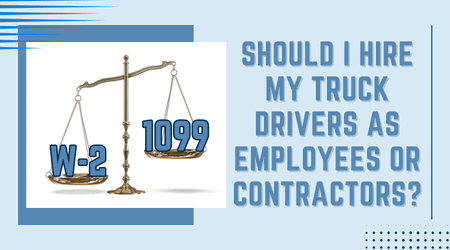Ways We Look Out for Your Business From operating accounts...
Read MoreNavigating the intricacies of trucking payroll can be a challenge, but having the right information at your fingertips can streamline the process. In this article, we’ll address the top 10 trucking payroll frequently asked questions (FAQs) related to trucking payroll to help you better understand the ins and outs of paying your drivers and keeping your business compliant.
What's the difference between paying truck drivers as employees or contractors?
Determining whether to classify truck drivers as employees or contractors carries significant legal and financial implications for businesses. This decision affects tax responsibilities, benefits eligibility, and overall organizational structure. Understanding the distinctions between these classifications is crucial for ensuring compliance with labor laws and creating a fair compensation framework that aligns with the specific needs of the trucking industry.
What are the different methods of calculating truck driver pay?
Truck driver pay can be calculated using various methods, each with its own set of advantages and considerations. From pay per mile and pay per load to hourly wages and percentage-based models, trucking companies have flexibility in choosing the approach that best suits their operations and the preferences of their drivers. Examining the intricacies of each method, understanding how they relate to factors such as route complexity, cargo type, and driver experience, enables businesses to design compensation plans that are competitive, motivating, and reflective of the demands of the job.
How do I stay compliant with payroll regulations in the trucking industry?
Navigating the complex landscape of payroll compliance in the trucking industry requires a comprehensive understanding of federal, state, and local regulations. Accurately withholding taxes, adhering to wage and hour laws, and staying current with industry-specific regulations are critical steps in ensuring compliance. The trucking sector faces unique challenges, such as addressing per diem allowances and accurately reporting International Fuel Tax Agreement (IFTA) data. Engaging with experts in trucking payroll and leveraging specialized software can help companies maintain impeccable compliance while focusing on their core business activities.
What role does a payroll service play in trucking companies?
Payroll services play a pivotal role in reducing the administrative burden associated with managing payroll processes for trucking companies. From calculating driver earnings, processing paychecks, and accurately withholding taxes to staying updated on changing compliance regulations, payroll services ensure that drivers are compensated fairly and in accordance with legal requirements. By outsourcing payroll functions, trucking companies can streamline operations, reduce the risk of errors, and enhance their overall efficiency and productivity.
What's the importance of accurate IFTA reporting for payroll?
Accurate reporting of International Fuel Tax Agreement (IFTA) data is vital for precise payroll calculations within the trucking industry. IFTA reporting involves documenting miles driven and fuel consumption across different jurisdictions, which directly impacts tax liabilities and reimbursements for truck drivers. Accurate reporting not only ensures that drivers are fairly compensated but also helps businesses avoid financial penalties and maintain a reputation for transparency and professionalism within the industry.
How do I manage taxes for truck drivers?
Managing taxes for truck drivers involves a intricate approach that includes proper withholding of federal and state income taxes, as well as Social Security and Medicare taxes. Additionally, addressing unique aspects such as per diem allowances, which provide reimbursement for meals and other incidental expenses incurred during trips, requires a thorough understanding of tax regulations. Successfully managing taxes not only ensures compliance but also enables accurate financial planning for both drivers and trucking companies.
What benefits should I offer to truck drivers?
Offering attractive benefits is a key strategy for attracting and retaining skilled truck drivers in a competitive market. Providing health insurance, retirement plans, and performance-based bonuses can significantly enhance driver satisfaction, loyalty, and overall job engagement. Benefits not only contribute to the well-being of drivers and their families but also position trucking companies as desirable employers committed to the long-term success and welfare of their workforce.
What strategies can streamline trucking payroll?

Streamlining trucking payroll processes requires a combination of advanced technology, meticulous record-keeping, and expert advice. Implementing specialized payroll software tailored to the unique needs of the trucking industry can automate many aspects of payroll calculation, reducing errors and increasing efficiency. Additionally, maintaining comprehensive records of driver hours, routes, and compensation ensures accuracy and transparency. Collaborating with professionals experienced in trucking payroll further optimizes the process, allowing businesses to focus on core operations while ensuring reliable and compliant payroll management.
How do I handle pay disparities among truck drivers?
Addressing pay disparities among truck drivers involves establishing transparent and fair pay structures that consider factors such as experience, route complexity, and additional responsibilities. Open communication about the reasoning behind compensation decisions is crucial to maintaining driver morale and loyalty. By implementing clear criteria for pay adjustments and creating a culture of fairness and equity, trucking companies can effectively manage pay disparities and foster a positive work environment that values the contributions of all drivers.
What are the unique challenges of trucking payroll and how to overcome them?
Trucking payroll poses unique challenges like precise mileage pay calculations, handling per diem allowances, and addressing detention and stop pay for delays. These hurdles can be tackled through specialized software, meticulous records, and expert advice. Utilizing mileage tracking software guarantees accurate mileage reimbursement, while managing per diem allowances demands a grasp of tax regulations. To handle detention and stop pay effectively, clear policies and communication channels are essential for accurate reporting. Leveraging technology and expertise allows trucking companies to successfully navigate these challenges and ensure fair compensation for drivers’ dedication.
Bottom line:
In the fast-paced world of trucking, understanding payroll is crucial. We hope this article has shed light on the most common questions that trucking companies face when it comes to payroll. Remember, staying informed and seeking professional guidance can make a world of difference in ensuring accurate payments, compliance with regulations, and the smooth operation of your business. Feel confident as you navigate the complexities of trucking payroll, armed with the knowledge from these FAQs. If you have more questions or need tailored solutions, don’t hesitate to reach out – we’re here to support your trucking payroll journey. We also have a page of regular FAQs that our clients have if you are more interested in signing up with us. Contact us for more information.
Tessa joined Superior Trucking Payroll Service in September 2022. She loves to write and make videos which made her a great asset to the team in her marketing position.
Before working at Superior Trucking Payroll Service she worked in IT at GVSU which gave her the skills to problem-solve with customers over the phone.
Contact Us!
Driver Retention Tips
One of the biggest problems for businesses in the world...
Read MoreHow to Avoid Payroll Errors and Penalties in the Trucking Industry
Are you tired of dealing with payroll issues in the...
Read MoreWhy Was No Income Tax Taken Out of my Paycheck?
Why Was No Income Tax Taken Out of my Paycheck?...
Read MoreUnderstanding Supplemental Payroll Fees: What They Are and Why They Matter
Are you a business owner trying to understand the complexities...
Read More






